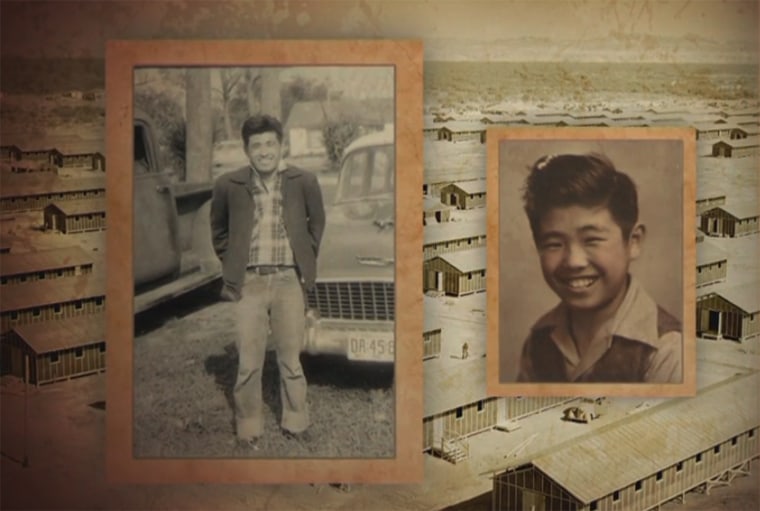NBC News' Emilie Ikeda On Family's Japanese Internment Camps Story
Category: News & Politics
Via: perrie-halpern • 2 years ago • 75 commentsBy: Scott Stump (TODAY. com)



This weekend marks 81 years since more than 125,000 people of Japanese ancestry living in the U.S. were ordered into internment camps during World War II, and the emotions have reverberated through the generations for Emilie Ikeda.
The NBC News correspondent paid a moving visit to the Japanese American National Museum in Los Angeles this week, exploring her personal connection to a shameful chapter in U.S. history.
For the first time, researchers have compiled all of the names of the Japanese Americans who were affected by Executive Order 9066 in 1942.
A 25-pound, 1,000-page book, known as the Ireicho, lists all 125,284 names, which include Emilie's grandparents. She wiped away tears on TODAY Feb. 17 as she marked the name of her grandfather, Bunji Albert Ikeda.
"He's since passed, so it's so meaningful to get to stamp his name," she said.

Emilie Ikeda's late grandfather, Bunji Albert Ikeda, was taken to a camp in Arizona with his family when he was just 7 years old.TODAY
Issued by President Franklin D. Roosevelt, the executive order placed West Coast residents of Japanese descent, regardless of citizenship, into incarceration camps while the U.S. fought Japan and the Axis powers during World War II.
Emilie's grandparents, who were 7 years old at the time, were among those sent to the camps. She shared an old interview she conducted with her grandfather for a school project about his time in the Poston camp in Arizona.
"I always questioned why I was in this internment camp," he said. "We had these canvas cots, we had to fill these bags with hay, and that's what we slept on."
Emilie's grandfather recounted his time in the internment camp in an old interview she conducted for a school project.TODAY
Emilie also met a survivor of the internment camps during her visit to the museum. Reiko Iwanaga, 84, was moved to tears when she saw her own name in the Ireicho.
"It's all very concrete to see it like this," she said on TODAY."It's an acknowledgement of what happened."
University of Southern California professor Duncan Ryuken Williams spent the past three years working to compile the book. Before now, it was not known exactly how many Japanese Americans were ripped from their homes and taken from their businesses and sent to the camps.
"The idea of giving back people's names, giving them individuality, again, in a way that their personhood wasn't acknowledged by the U.S. government back in World War II," Williams said on TODAY about his inspiration for the project.
The museum sits on the very site where many Japanese Americans were put on buses headed to the camps 81 years ago.
"JANM is one of those ground zero points in the civil rights history of this country," museum president and CEO Ann Burroughs said on TODAY. "So there's enormous power of place to have this book here."
The Japanese American National Museum contains jars filled with soil from all of the camps where Japanese Americans were held against their will during World War II.TODAY
The museum also contains small jars filled with soil from all of the different internment camps, which were spread out between California, Utah, Colorado, Arizona, Arkansas and Wyoming, according to the National Archives.
The Ireicho is on display in Los Angeles until October, and anyone is welcome to stamp the book. The urgency to remember has only intensified as many of the first-hand survivors are dwindling now that they are in their 80s and 90s.
Iwanaga was accompanied on her visit to the museum by her daughter, Maya, who stressed why it's so important to never forget.
"So it doesn't happen again," she said. "So many people don't know this happened."
Scott Stump
Scott Stump is a staff reporter and the writer of the daily newsletter This is TODAY. He has been a regular contributor for TODAY.com since 2011, producing news stories and features across the trending, pop culture, sports, parents, pets, health, style, food and TMRW verticals.

 Article is LOCKED by moderator [Perrie Halpern R.A.]
Article is LOCKED by moderator [Perrie Halpern R.A.]



another in a long list of regrettable instances in our collective american history that has yet to be rectified.
A chapter in our history of which we should be ashamed.
Something else we have yet to really acknowledge.
In law school we learned that to seek equity, one must come with clean hands. IMO that same adage should be applied elsewhere, such as that one should not criticize other governments for doing what one did themselves. But the hypocrisy of some members on this site proves that what is similar to the adage about clean hands is often ignored. Think of the line from Bob Dylan's 'The Times They Are A'changing': "Come mothers and fathers throughout the land, And don't criticize what you can't understand"
The Japanese internment camps weren't set up because of "racism," they were set up because America was attacked by Japan.
There is a moral to this story:
Don't blame an entire group for what a government or a segment of the group does.
They were all held to be potentially guilty and were punished due solely to their race. That's the very definition of racism.
Advice our government should have taken, but didn't, in regards to those of Japanese origin living in the US during WWII. Odd, they didn't see a need to intern all people of German origin. I wonder what the difference could possibly have been?
I think that's a stretch Sandy.
Odd, they didn't see a need to intern all people of German origin. I wonder what the difference could possibly have been?
The entire German population was held responsible for the Holocaust. Therefore, Sandy, nobody should be able to cry "victim,"
I don't see how you could possibly defend that statement.
The Jews living in Germany were held accountable for the Holocaust? Or were they not part of the German population? Or do you want to rethink that statement?
It's fairly straightforward. The reason, not a good reason, was simply because Japan attacked the US. BTW Germany did not attack the US and defeating Germany was FDR's top priority.
Veiled usage of the race card already today...................???
Sandy, you are better than that.
Were the German people as an entire national group held accountable for that or not?
No, they just declared war on us. Totally ok.
Already today? Have you seen how old this article is?
You tell us why those whose origins were Japan were interned wholesale, and those whose origins were German and Italian were not, Jim.
No, they were not.
The German population contained Jews, Gypsies, and quite a few people who sheltered those who would have been sent to concentration camps, at risk of their own lives.
The portion of the German population who didn't stand up to Hitler have been blamed.
Those who opposed him were not.
It's a pretty simple concept.
May I?
Japan attacked us. Germany & Italy did not.
Germany and Italy declared war on us, Vic. Should all Italians have been suspected of treason and interned?
That is simply not true. I grew up in the shadow of WWII and nobody ever gave the German people any such consideration. As a matter of fact there were many killed after the war was over:
"In Western Europe it was really just a case of restoring law and order. There were a lot of people who wanted revenge and retribution for what they had been through; a lot of others who used the chaos as a cover for criminal activities; and some large Communist movements whose members were agitating for revolution, often against the wishes of their leaders."
There is a difference between a declaration of war and a surprise attack.
Should all Italians have been suspected of treason and interned?
Where did I say that Japanese Americans should have been interned?
German Jews were blamed for being put in concentration camps?
Or are you excluding German Jews from being Germans?
You conveniently missed these paragraphs in your link.
So, in a link meant to support a complaint that Germans were being killed after the war, you neglected to read the paragraphs that stated that Germans making those complaints were exaggerating.
Same with French collaborators and Italian Fascists.
You should really read your links more thoroughly.
You can do better than that.
Or are you excluding German Jews from being Germans?
You know better.
You conveniently missed these paragraphs in your link.
Innocent Germans paid for what the Nazi's did. You have no empathy for them. Thus you may not claim victimhood for Japanese, Muslims or anyone else, That is my standard.
PS. The war that Japan started with the US was not based on race.
To be fair, you didn't. But you have defended treating them worse than those from other countries who declared war on us.
You declare it's not racism to hold all of a particular race accountable for the wartime actions of those of their race, from another country. But you turn right around and defend not doing the same to Caucasians from European countries who went to war against us.
They all declared war against us, Vic.
Now, this being the United States of America, we shouldn't have detained anybody without probable cause to suspect that they had actually committed a crime. But we did, in the case of Japanese citizens, and that's a black mark on our history. And there is no reasonable way to argue that it wasn't race-based. That's racism. Refusal to acknowledge blatant racism is defense of racism.
hell yes, most of those sheep herding olive pickers hadn't gotten off the boat more than 25 years before... /s
No, Vic, you're moving goalposts. These were your words:
The "entire German population" included quite a few people who were victims of the Holocaust. So, no, the "entire German population" were not held accountable for the Holocaust.
Very presumptuous, and a personal insult.
Straw man. Nobody ever said it was. The internment of Japanese Americans was decidedly based on race.
No, that was not the point. You seem to think they were interned because of race. I never thought they should have been interned, but I am pointing out that it was because of the surprise attack on Pearl Harbor.
Now, this being the United States of America, we shouldn't have detained anybody without probable cause to suspect that they had actually committed a crime.
Agreed.
But we did, in the case of Japanese citizens, and that's a black mark on our history. And there is no reasonable way to argue that it wasn't race-based.
I believe I just did.
Refusal to acknowledge blatant racism is defense of racism.
I'll ignore that Sandy.
Have a good day.
Most unsuccessfully.